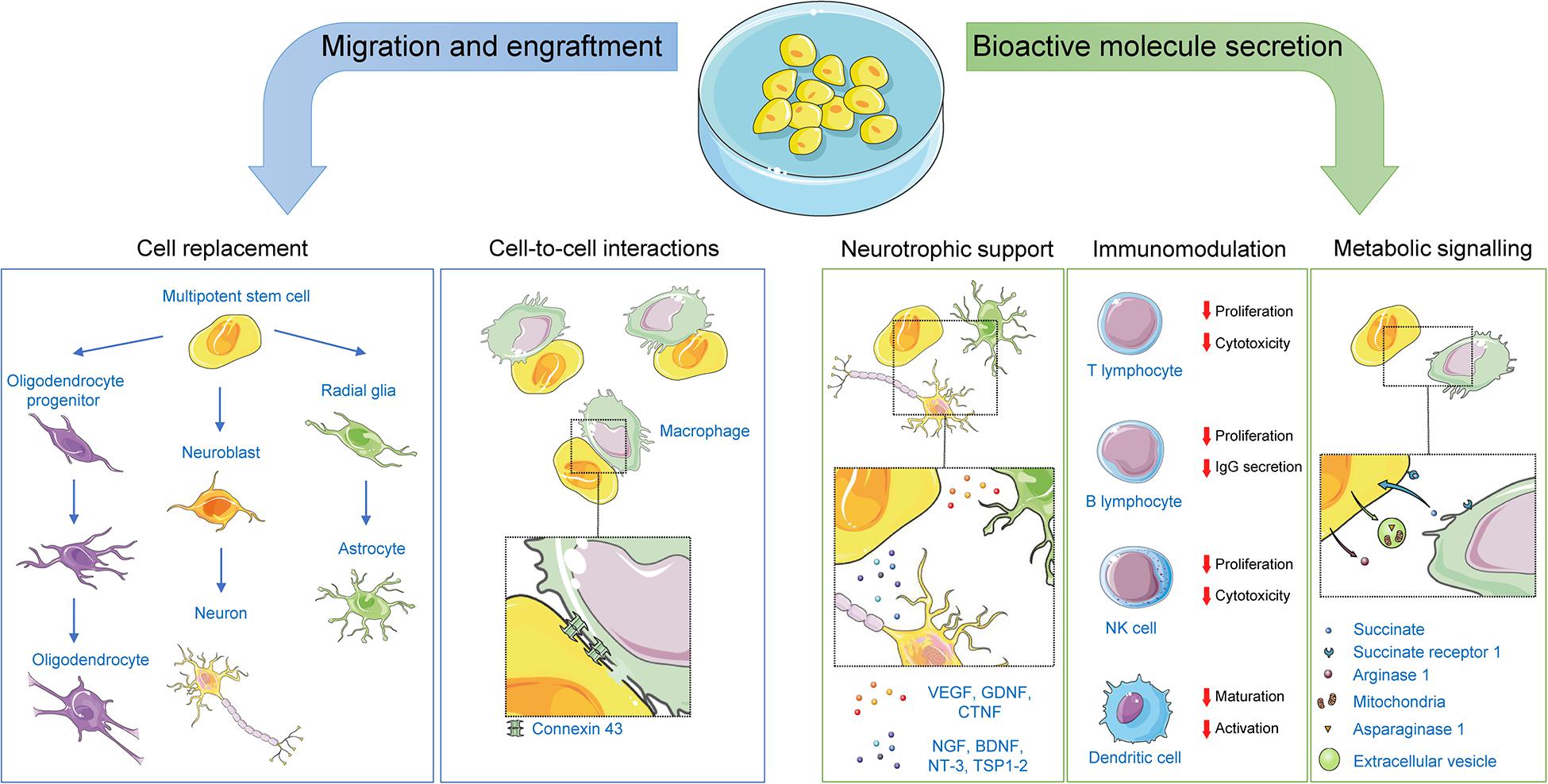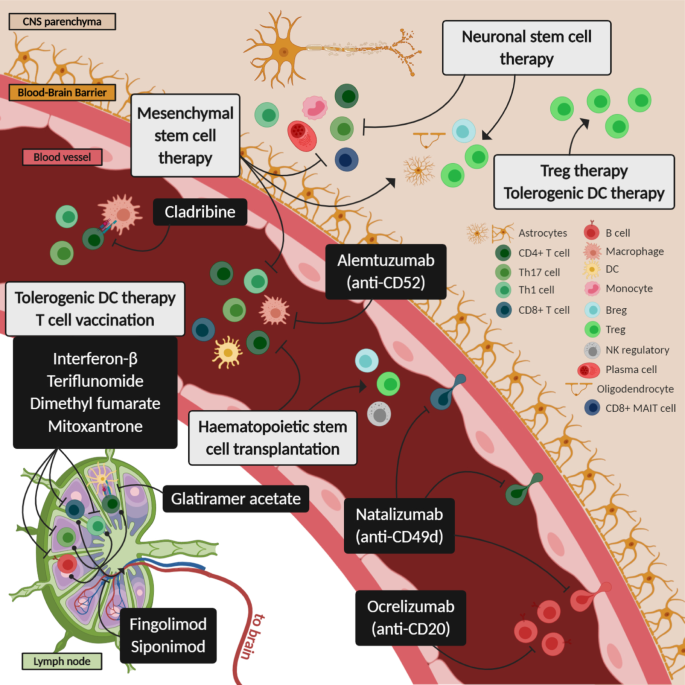The Single Strategy To Use For Regenerative Medicine For Multiple Sclerosis
Table of ContentsThe Best Strategy To Use For Regenerative Medicine For Multiple SclerosisThe Facts About Regenerative Medicine For Multiple Sclerosis RevealedRegenerative Medicine For Multiple Sclerosis Things To Know Before You BuySome Ideas on Regenerative Medicine For Multiple Sclerosis You Need To KnowGetting My Regenerative Medicine For Multiple Sclerosis To WorkUnknown Facts About Regenerative Medicine For Multiple SclerosisSome Ideas on Regenerative Medicine For Multiple Sclerosis You Should Know
The mesenchymal stem cells transplanted throughout stem cell therapy can separate and develop to develop new cells that can replace the damaged cells of the anxious tissue. This could restore neurological functions in individuals with this problem. These advantages of stem cell treatment are additional sustained by the ability of MSCs to promote healing.Individuals with multiple sclerosis are generally treated with mesenchymal stem cells. These are multipotent stem cells that have the capability to differentiate and mature to create a large range of cell types in the body. As soon as transplanted, these stem cells can establish to develop healthy and balanced nerve cells hence supporting the regrowth of the damaged cells of the nerve system.
When hair transplanted, the stem cells move to locations of inflammation or damage within the central nerve system (CNS). They are naturally brought in to the websites of injury where the body immune system is assaulting the myelin sheath, the safety covering of nerve fibers. The stem cells work by promoting the repair service and regeneration of harmed myelin, possibly bring back feature to influenced afferent neuron.
The Best Guide To Regenerative Medicine For Multiple Sclerosis
Stem Cell Research on MS The National Numerous Sclerosis Society, along with various other companies, is actively funding and sustaining research study into mesenchymal stem cell treatment for numerous sclerosis to discover their prospective and improve therapy methods. The goal is to develop safer and much more reliable means to make use of stem cells in treating MS.
4 Simple Techniques For Regenerative Medicine For Multiple Sclerosis
Here are reviews from evaluations of people Swiss Medica clinic. The person traveled from Romania looking for treatment for MS after listening to favorable feedback about stem cell treatment for the disease.
Get a free online consultation to discover just how stem cells will work for your instance, and what are the duration and cost of the therapy. Uccelli, A., Laroni, A., Brundin, L., Clanet, M., Fernandez, O., Nabavi, S. M. Regenerative Medicine for Multiple Sclerosis., Muraro, P. A., Oliveri, R. S., Radue, E. W., Sellner, J., Soelberg Sorensen, P., Sormani, M. P., Wuerfel, J. T., Battaglia, M
Stem cells are cells in the body that can mature into grow cells that serve a specific functionParticular There are two primary kinds of stem cells: beginning stem cells and adult stem cells.
are located in some adult cells and body organs including the bone marrow, skin, blood, and mind. Adult stem cells are not as versatile as embryonic stem cells and are therefore extra restricted in regards to the sorts of cells they develop right into. The unique buildings of Recommended Site stem cells offer promise for brand-new treatments that can slow/halt MS illness task and repair tissue damages in the main nerves.
Indicators on Regenerative Medicine For Multiple Sclerosis You Should Know

The treatment includes gathering stem cells from a person's very own (autologous) bone marrow. The individual is after that treated with chemotherapy to deplete the immune system and stem cells are reestablished into the body where they grow right into brand-new, healthy and balanced immune cells - Regenerative Medicine for Multiple Sclerosis. Stem cells can be injected into the body in various methods

In 2000, the MS Culture of Canada and MS Scientific Study Structure funded a clinical test including HSC transplants, led by Drs. Mark Freedman and Harry Atkins from the Ottawa Hospital Study Institute/University of Ottawa. The aHSC treatment readily available in Canada is a treatment that uses high-dose chemotherapy, also called conditioning.

Getting The Regenerative Medicine For Multiple Sclerosis To Work
Neural stem cells (NSC) are located in the brain and can mature right into different sorts of mind cells including neurons, oligodendrocytes, and astrocytes. NSCs may serve to fix or shield the mind and regulate the body immune system. Early clinical tests in non-human primates showed that therapy with NSCs profited the development of MS-like illness in pet designs.
The arise from these security research studies are positive for future stem cell and regenerative medicine treatments in MS. Future medical trials (phase 2 and 3) with larger numbers of participants and controls are needed to evaluate the efficacy of this therapy for MS. As shown by the instances over, there is a vast selection of research taking location that will give added responses regarding making use of stem cells to deal with MS.
Stem cell treatment is thought about secure, yet, like any medical procedure, it carries some dangers, such as short-term swelling or pain at the shot site. Nonetheless, severe adverse effects are rare when carried out by certified experts.
Regenerative Medicine For Multiple Sclerosis - An Overview
Numerous this article sclerosis (MS) is a chronic disease of the central nerves that affects the mind and spine. It is identified by the deterioration of myelin, a substance that covers nerve fibers, leading to interruptions in communication in between the brain et cetera of the body. Symptoms can differ commonly and consist of muscle mass weakness, vision troubles, imbalance, and fatigue.
Several sclerosis is defined by the body immune system incorrectly striking the protective sheath (myelin) that covers nerve fibers, creating interaction problems in between the brain and the remainder of the body. The condition can cause the damage or long-term damages of nerves. Signs differ extensively amongst individuals and can include tiredness, flexibility problems, discomfort, and cognitive changes.